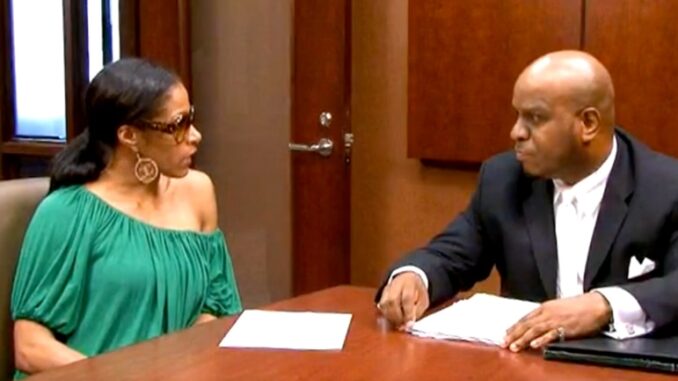
The Silk Pajamas and the Shard of Truth: How the "Pillow Talk" Party Became RHOA Legend
Atlanta. A city where the sweet tea is as potent as the shade, and the Housewives reign supreme. For years, The Real Housewives of Atlanta has perfected the art of turning social gatherings into operatic battles, transforming the mundane into the memorable. While countless verbal sparring matches and wig-snatching threats dot its illustrious history, one particular party planning debacle, or rather, the party intended to prevent conflict that instead detonated into chaos, has ascended to legendary status: the "Pillow Talk" party. It wasn't just a fight; it was a seismic event that exposed the raw nerve of the show, illustrating the precarious balance between aspirational living and unfiltered human drama.
The concept itself, proposed by Apollo Nida, Phaedra Parks’s then-husband, was deceptively benign, even ironically so. The idea was to gather the ladies in their silken best – think luxurious pajamas and velvet robes – for an intimate, low-lit evening of "pillow talk." The aim? To air grievances gently, to clear the air, to foster a new level of understanding amongst a group constantly teetering on the brink of implosion. It was a noble, if naive, ambition, given the show's inherent mandate for confrontation. The stage was set for vulnerability, but what truly awaited was a powder keg.
The simmering tensions that prefaced the event were a tapestry of RHOA’s most potent ingredients: whispers of infidelity, accusations of betrayal, and the ever-present competition for attention and perceived moral high ground. Kenya Moore, a flamboyant and often provocative figure, had been accused by Phaedra and Apollo of inappropriate flirting, allegations Kenya vehemently denied. This particular thread of contention was the live wire in the room, threatening to short-circuit the carefully constructed illusion of intimacy.
As the evening progressed, fueled by champagne and the false security of their plush surroundings, the "pillow talk" quickly devolved into pointed accusations. The conversation, ostensibly about clearing the air, inexorably circled back to Kenya and Apollo. Kenya, ever the master of deflection and dramatic flair, brought her friend and assistant, Brandon DeShazer, into the fray as a witness to her character. This proved to be the spark that ignited the conflagration.
The transformation from hushed whispers to a full-blown physical altercation was shockingly abrupt and viscerally impactful. As Apollo’s anger, fueled by what he perceived as Kenya’s continued disrespect and Brandon’s protective interjections, escalated, the velvet gloves came off. What began as a heated exchange between Brandon and Apollo quickly became a horrifying, chaotic scuffle. Limbs flailed, furniture overturned, and the air filled with the cacophony of screams – most notably Kandi Burruss's guttural yells as she intervened, caught between defending Brandon, her friend, and trying to halt the escalating violence involving Apollo, a man she had once considered a friend. Todd Tucker, Kandi's husband, also jumped into the fray, attempting to de-escalate the situation, only to get pulled further into the maelstrom.
The impact was immediate and chilling. Viewers, accustomed to verbal fireworks, were genuinely stunned by the physical violence. The luxurious, intimate setting was shattered, literally and figuratively. Security, an ever-present but often unseen component of these gatherings, finally rushed in, pulling apart the flailing bodies. The aftermath was a scene of disarray: emotional wreckage, physical bumps and bruises, police reports, and a collective sense of shock that reverberated through the cast and audience alike.
This party planning fight, ironically designed for peace, became RHOA legend for several profound reasons. Firstly, its sheer, unexpected physicality shattered the unspoken fourth wall of reality television. While arguments are expected, physical altercations of this magnitude were rare, highlighting the raw, unpredictable nature of human emotion when pushed to its breaking point under the glare of cameras. Secondly, it was a defining moment for several key players. Apollo’s volatility was laid bare, contributing to his subsequent legal woes. Brandon’s loyalty to Kenya, and Kandi’s fierce protectiveness of her friends, cemented their roles within the group dynamic.
Finally, and perhaps most importantly, the "Pillow Talk" party perfectly illustrated the fundamental tension that makes The Real Housewives of Atlanta so compelling. It's a show built on the aspirational fantasy of wealth, glamour, and sisterhood, but consistently delivers the chaotic, unscripted reality of human fallibility, insecurity, and explosive conflict. The "Pillow Talk" party was the ultimate deconstruction of this facade. The silk pajamas became a metaphor for the thin veneer of civility that can be ripped away in an instant, revealing the sharp, ugly shards of unresolved grievances and fractured relationships underneath. It wasn't just a party that went wrong; it was a masterclass in how reality television, at its most potent, can turn a simple gathering into an unforgettable, legendary spectacle of human drama.